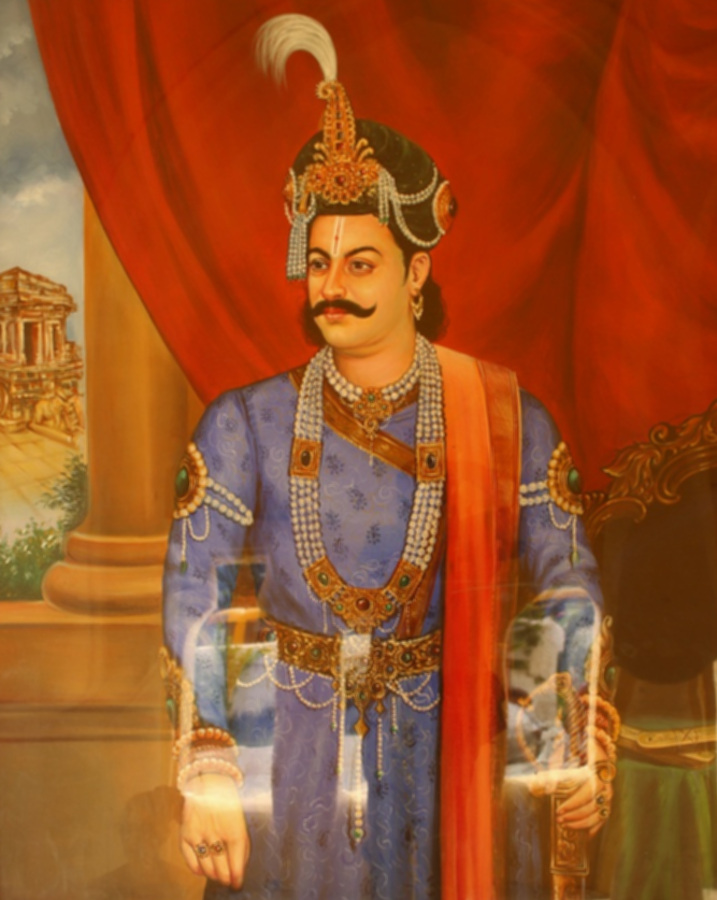Krishnadevaraya

Krishnadevaraya was a prominent ruler of the Vijayanagara Empire of South India during 15th and 16th century. As the third ruler of the Tuluva Dyna sty of the Vijayanagara Empire, he extended the empire to most of South India, which
included present-day Karnataka, Northern Tamil Nadu and Andhra Pradesh, stretching upwards in the northeast to Cuttack. He ascended the throne during the most critical stage of the empire and went on to consolidate it as a flourishing
empire. He played a major role in defeating the Bahmani Sultans and Portuguese, forcing them to retreat their plans of expanding their empire beyond their boundaries. Along with his prime minister and mentor, Timmarusu, he defeated
the Bahmani Sutans, thereby conquering their fortresses of Bidar, Gulbarga, Raichur, and Bijapur. He led a major campaign against the Gajapatis of Odisha, following which he seized and captured the fortresses of Udayagiri, Kondavalli
and Kondavidu. He is often compared with the greatest emperors of Asia and Europe, due to his brilliant achievements and exceptional ability to maintain political stability in the Deccan. By ruling the three most powerful territories
in the southern peninsula of India, he was known by different titles, earned as a mark of respect, such as ‘Kannada Rajya Rama Ramana’ (Lord of the Kannada empire) and ‘Andhra Bhoja and ‘Mooru Rayara Ganda’ (King of three Kings).
He ascended the throne in 1509 and developed a strong relationship with the empire’s Prime Minister, Timmarusu, whom he looked upon as a fatherly figure.He was crowned during the gloomiest period of the Vijayanagara Empire and hence,
spent the first few years of his reign battling sieges and conquests to consolidate the kingdom. Since the Portuguese dominated the sea trade along the Indian coastline, he developed friendly relations with them, following which
he traded Arabian horses and guns from the Portuguese merchants. He engaged Portuguese engineers in improving the supply of water in Vijayanagara City, apart from receiving arms and war materials for invading Raichur.
Following the defeat of the Sultan of Bijapur, Sultan Mahmud, in 1509 at his hands, towns and villages in Vijayanagar saved from annual raids by the Deccan sultans.
He annexed Raichur Doab and subsequently, raided Bidar, Gulbarga and Bijapur, thereby disintegrating the Bahmani Sultans, and took upon the title ‘establisher of the Yavana kingdom’.
In 1512, he defeated the Ummatur chief, Ganga Raja, to expand his empire – as a result of this defeat, the latter drowned in the waters of Cauvery River. The region was added to the Srirangapatna province.
As part of his third campaign in South India, he conquered Bezwada, on the banks of Krishna River, followed by the invasion of Kondapalli and forts in Nalgonda and Warangal. Prathapa Rudra’s plan of crushing Krishnadevaraya and his
army was crushed by his attack on the Gajapati Empire’s capital, Cuttack, forcing the former to surrender. After completely thrashing the Bijapur army, he destroyed the fort of Gulbarga, the former Bahmani capital, though he reinstated
the kingdom to Muhammad Shah.
By invading and conquering the different territories in the Bahmani kingdom, he succeeded in expanding his empire to South India.
Krishnadevaraya ruled ancient India’s Vijayanagara Empire for only about two decades, however his power, skills, and personality were made known in that short amount of time and so it seemed much longer. His military campaigns expanded
the empire and made it a seat of power, his artistic and architectural interests withstood the passing of time and influenced others, and his diplomatic skills had an impact on how the Portuguese viewed and interacted with the subcontinent.
Due to his high respect and support for art and Telugu literature, his reigning period came to be known as the golden age of Telugu literature, though Sanskrit, Kannada and Tamil literates were also patronized.
He appointed Ashtadiggajas, or eight poets, in his court – Pingali Surana, Nandi Thimmana, Dhurjati, Ramaraja Bhushanudu, Madayyagari Mallana, Tenali Rama Krishna, Ayyala-raju Rama-Bhadrudu, and most importantly Allasani Peddana.
Gallery
Our Mission
Unity & Leadership without boundaries

CREATE LEADERS

SUPPORT UNITY

NURTURE LEADERSHIP

COMMUNITY SERVICE